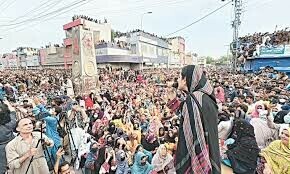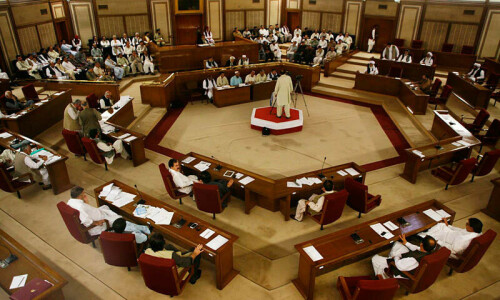HYDERABAD, Dec 5: The Sindh Abadgar Board (SAB) on Wednesday demanded that the government make the sugar mills pay the official rate of Rs67 per 40 kilogramme of sugarcane and called for imposition of ban on the establishment of any sugar mill in the province during next five years.
The board’s meeting chaired by its chief Abdul Majeed Nizamani urged the government to honour its own notification fixing rate of sugarcane at Rs67 per 40 kilogramme and demanded dismantling of sick units.
The meeting demanded that the government should place permanent ban should on the establishment of sugar industry in the wheat and cotton growing areas.
The growers observed that PSMA’s southern zone had once again displayed its political clout by defying government orders on starting crushing season on Oct 1.
The growers had reluctantly accepted the last year’s cane price of Rs67 per 40kg and supplied cane to the mills from the very first day but just after ten days the mill owners unilaterally, arbitrarily and illegally announced its own price of Rs56 per 40kg.
They were also trying to enforce zoning system and deduction on growers, the meeting said calling upon the government to order an investigation into why sugarcane was cultivated on three million acres of land at a cost of 11MAF water, 2.5 million bales of cotton and one million tons of wheat.
The meeting claimed that the country had suffered a loss of a staggering amount of Rs63.4 billion just for the sake of sugar mill industry.
Expressing concern over wrong planning and exaggerated production estimates and targets of different crops by the Ministry of Food, Agriculture and Livestock (Minfal), the meeting demanded strict action against the officials who were making wrong estimates just to get promotions and good remarks in their ACRs.
The meeting quoted the example of totally distorted figures and targets of last year’s wheat crop, which resulted in export of wheat at a throwaway price of $200 per ton. The country had to import wheat at $440 per ton after it faced shortage of the cereal due to excess export.
The meeting reminded the government that the poor growers received only Rs425 per 40 kg for their crop. It the past also, the government had created cotton and sugar crisis by showing artificial shortage of the crops, the growers said.
The meeting urged the government to save agricultural economy from the nexus of export and import mafia and politicians and expressed grave concern over auction of mortgaged lands.
The participants believed that the agriculture losses suffered by the growers in Sindh during current year had no parallel in the 60 years history of Pakistan.
The national economy had suffered Rs177 billion losses due to production losses in wheat, cotton, rice and edible oil and steep rise in the prices of fertilisers and petrol, the meeting observed.
The meeting said that Sindh had already suffered huge losses due to injudicious distribution of water, lawlessness, tribal disputes, corruption and cyclones. The province lost Rs64 billion only in rice and cotton crops, the participants said.














































Dear visitor, the comments section is undergoing an overhaul and will return soon.